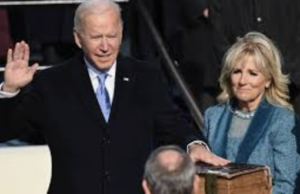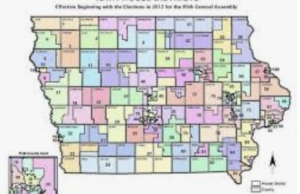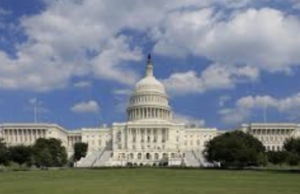Letting their Light Shine: Voters weigh presidential candidates’ religious records
By Suzanne Droste 2005
In the 1960 presidential election, John F. Kennedy spent much of his campaign time convincing people that is Catholic faith would no influence his presidency. Now, almost 45 years later, our presidential has taken the opposite stance on religion.
Since the beginning of his political career, President George Bush has made no secret of his Christian faith. When asked during a Republican debate in 2000 which political philosopher he most admired, Bush said, “Jesus Christ, because he changed my heart.”
Presidential candidate John Kerry has taken the opposite road — much like the one Kennedy took in 1960. Being only the third Catholic to seek the presidency on a major-political ticket, many are pushing Kerry to say that his Catholic faith will in fact influence his decisions as president. However, Kerry has repeatedly said that his religious beliefs are person al and will be separate from his job as president.
Regarding religion, Kerry said, “You wear it in your heart and in your soul, not necessarily on your sleeve. It’s not something you ought to push at people every single day in the secular world.”
The media plays clips here and there regarding religion, but religion in politics has in some ways become taboo for the media to discuss. Therefore, many rumors about each of this year’s presidential candidates faiths and religious beliefs are flying around.
“When I was younger, religion in politics definitely wasn’t as big of a deal as it is now,” Enrique Ochoa, the senior high student director at Nazareth Lutheran Church, said. “Faith, it seems, was more accepted and allowed. Now, it is viewed as almost ‘illegal’ in politics.”
It is hard for the media to report on religion because it has no cut and dry answer. Playing clips is easy, but there aren’t 10-second video or audio segments to explain a person’s heart.
“We live in an era of sound bites. It’s easier to pick out a sound bite than dive into issues that aren’t black and white,” Fath James Secora of St. Patrick’s Catholic Church said. “They try to find the simplest answers instead of delving too deeply into religion.”
The media’s lack of coverage can confuse some facts and create false connections. An example of this is the recent amount of people who when asked whom they are going to vote for in the presidential election say they are going to vote for President Bush because he is a more religious man.
But what has made people believe Bush is more religious than Kerry?
Voting for Bush, for some, has become not a vote for Bush, but a vote “against someone who’s not religious.”
However, Kerry was born and raised a Catholic, and, when asked, he openly professes his love of God. The differences in his faith and the faith of President Bush is that he keeps it personal.
This leads some to draw the conclusion that talking about religion frequently may be evidence that someone is more religious.
“Just because politicians profess to be of a certain faith doesn’t mean they actively believe in the principles of their religion,” Mormon senior David Hanson said.
With this in mind, some think voting because one thinks someone is more religious can be a little dangerous.
“A person voting on a religious line is narrowing him or herself too much. I respect the candidates’ views, but people need to look at issues,” history teacher Robert Schmidt said.
On the other hand, religion influences many issues.
“Some bills already have religious views built in, but it’s sometimes impossible not to go into religion,” Schmidt said.
Abortion, stem cell research, gay marriage, funding for religious organizations, war, death penalty, prayer in school — all of these issues are moral and ethical debates that draw a lot of religious controversy and opinions.
“Religion is what you believe in. It is the foundation of my life, and it would be impossible for it not to play a role in my stance on issues because it influences everything I do,” Catholic senior Nic Wetzel said.
But how much should religion be involved in politics?
“If religion is genuine and real, that’s the way it should be,” Ochoa said. “I don’t think it should be the main thing, but it should have its place in politics.”
Religion has become an important issue in this election, and one statement is being heard from the lops of politicians and citizens alike: “God’s on our side.”
However, what God do they mean? The statement implies the Christian God considering the September issue of Mother Moon magazine found that 38 percent of Americans wouldn’t vote for a well-qualified Muslim for president, and 52 percent would not vote for a well-qualified atheist.
These numbers and statements have sparked the recent interest in the role religion is playing in politics, hence the question: “Whose side is God on?”
“One of my favorite quotes came from Abraham Lincoln,” Reverend Cathy Young of Cedar Heights Presbyterian Church said. “He said that the important thing isn’t if God’s on my side. It’s if I’m on the side of God.”
Today, there are arguably more than 4,500 documented religions in the world, and 60 percent of Americans believe that religion can solve all the current world problems according to the article in Mother Moon. Therefore, religion plays a huge role in cultures, so, when campaigning for votes, politicians can’t ignore it.
“That’s what politicians do. It’s like car salesmanship. The think about their audience, and that’s the way they go,” history teacher Kevin Stewart said. “If they are in the Bible Belt, they will talk about the Bible. It’s just being a politician.”
This November, Bush and Kerry are both vying for the religious vote. As learned last time around, every vote counts; just like the war, the economy and health care, religion is an important issue in this presidential race.
Both parties want to close the religious gap to help them become president.
Presidential faith is a subject with many thorns. Does the sound-bite conscious media really do the candidates’ faiths justice? Who is more religious? How much piety does American want in the White House? Whose side is God on?
Americans will answer all these questions on Nov. 2. In the end, after all the talking has ceased, if people are worried about the candidate’s faith, their actions and records will speak far louder than their words.
And, without a doubt, the media will still be scrambling to find a sound bite to sum it all up.









You must be logged in to post a comment Login